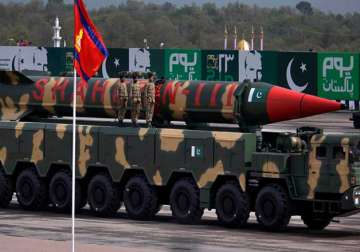An American think-tank has said that Pakistan risks increasing global isolation when it comes to purchase of high-tech defence items.
The report entitled ‘Military Budgets in India and Pakistan: Trajectories, Priorities, and Risks’, said that Pakistan’s access to high-end technology could be constrained by India’s purchasing power and growing geopolitical influence.
“Over the long term, Pakistan may be unable to access the most advanced weapons systems in the global marketplace. Instead, it may have little choice but to continue to rely on Chinese and possibly Russian military systems, which may or may not be the most appropriate for Pakistan’s defence needs,” the Stimson Center, a nonprofit, nonpartisan institution devoted to enhancing international peace and security through a combination of analysis and outreach, said in a report.
American military aid accounted for 21 per cent of Pakistan’s defence spending between 2002-2015, allowing the country to maintain high levels of military spending while easing the burden on its federal budget and overall economy.
“The US has begun to gradually downgrade its assistance to Pakistan in the near to medium term,” it said, adding that the support in Washington for the bilateral relationship has declined as Pakistan seems unable or unwilling to address concerns about violent extremist groups that direct their focus to Afghanistan and India.
India is a larger and more attractive market for global defense companies, and will continue to be for the foreseeable future, the report said, adding that the country has become the world’s largest arms importer.
India accounted for 14 per cent of global arms imports from 2011-2015, a 90 per cent increase over the previous five years.
“Countries and companies who otherwise would be interested in having a defence relationship with Pakistan may be reluctant to do so out of concerns about falling out of favour in New Delhi,” the report said.
“In the long run, Pakistan will have to make tough choices about purchasing big-ticket weapons systems unless it can do so at concessionary rates,” it said.
The “almost-certain decline” in military and financial support from the United States will force Pakistan to carry a greater share of its defence spending, it said.
With PTI Inputs
Latest World News

